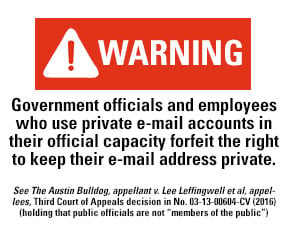No more hiding identities of the public officials who do government business on private e-mails
Updated Tuesday April 12, 2016 10:54am (to add link to Corpus Christi Caller-Times coverage)
Updated Wednesday April 13, 2016 1:28pm (to add link to Watchdog.org Texas Bureau coverage)
Updated Thursday April 14, 2016 1:46pm (to add link to FierceGovernmentIT coverage)
Updated Wednesday April 20, 2016 3:07pm (to add link to FindLaw publication of opinion)

More than five years after The Austin Bulldog filed a lawsuit against Mayor Lee Leffingwell, the other six council members, and the City of Austin, the Austin-based Third Court of Appeals on April 8, 2016, handed down a landmark legal decision. The court ruled that government officials are not “members of the public” and when they use private e-mail accounts to conduct public business they will forfeit the right to keep their e-mail addresses concealed from the public.
The Third Court’s ruling advances the public’s interest in holding government officials accountable. The decision is of vital interest in government and legal circles, and it triggered a front-page story in the Austin American-Statesman as well as articles in both the Texas Tribune and Law360.com, a national publication covering the legal industry.
 The decision serves notice to elected officials and others in government service that they ought to do the public’s business through their government-issued e-mail addresses—and not hide public information by using personal accounts.
The decision serves notice to elected officials and others in government service that they ought to do the public’s business through their government-issued e-mail addresses—and not hide public information by using personal accounts.

“Any time a public official uses a private e-mail account for public business—that’s highly suspect,” said Attorney Joseph Larsen, special counsel to Sedgwick Law in Houston (who subsequently moved to Gregor Cassidy PLLC) and a board member of the Freedom of Information Foundation of Texas.
Decision will have wide impact

The Appeal Court’s decision not only applies to the City of Austin, a defendant in The Austin Bulldog’s lawsuit, but to all governmental agencies within the 24-county jurisdiction of the Third Court of Appeals. State agencies based in Austin should take heed. So should Texas Governor Greg Abbott. The governor roundly criticized presidential candidate Hillary Clinton’s e-mail imbroglio stemming from her use of a private e-mail server while Secretary of State. Last year the Texas Tribune reported that Abbott, too, has shielded his private e-mail accounts using the “member of the public” exception.

Attorney Bill Aleshire of Austin-based Aleshire Law PC, who represented The Austin Bulldog in the lawsuit, said, “Technically the opinion only applies to the Third Court’s district, but it should serve as a precedent elsewhere. And from now on, the Attorney General should follow it when issuing opinions.
“To the best of my knowledge, the Attorney General has held directly opposite of this opinion every time the issue of shielding public officials’ e-mail addresses came up in an open records request. That will stop,” Aleshire said.
“The decision will also apply to any public information requests made from now on—even if the e-mails were written previously.”
Lawsuit part of open meetings investigation
The Austin Bulldog’s investigative report of January 25, 2011, exposed the illegal, institutionalized practice of holding regularly scheduled round-robin meetings to discuss council meeting agendas behind closed doors in the days preceding public council meetings.
In legal terms, that practice constituted a conspiracy to circumvent compliance with the Texas Public Information Act, as defined in Government Code Chapter 551.143(a):
“A member or group of members of a governmental body commits an offense if the member or group of members knowingly conspires to circumvent this chapter by meeting in numbers less than a quorum for the purpose of secret deliberations in violation of this chapter.”
Uncovering the City Council’s closed-door deliberations led to the question of whether these elected officials might also be violating the Act through quorum discussions of City business via e-mail. To find out, The Austin Bulldog in January 2011 filed two public information requests for e-mails exchanged by the mayor and council members over a 13-month period.
In responding to these requests, the City charged The Austin Bulldog $1,039 to provide some 2,000 pages of messages sent and received on their city e-mail accounts. But the City refused to provide messages about city business exchanged through the elected officials’ private e-mail accounts. As a result The Austin Bulldog filed a lawsuit March 1, 2011, to get those messages.
After being sued, one-by-one the elected officials released batches of e-mails from their private accounts, some just a few pages and others hundreds.
But in all the private-account e-mails released, the sender and receiver’s addresses were blacked out. That made it difficult, if not impossible, to identify which officials were involved in the communications. These redactions prevented determining whether these officials had violated the Texas Open Meetings Act by holding a quorum discussion about city business outside a properly posted public meeting.
County attorney investigates


The investigative report published by The Austin Bulldog, and a formal complaint filed by civic activist Brian Rodgers, resulted in a criminal investigation conducted by County Attorney David Escamilla—announced later the same day the Bulldog report was published. Over the next 20 months, investigators gathered more than 30,000 pages of documents, including subpoenaed telephone records, text messages, and unredacted copies of the private e-mails.
At the investigation’s conclusion in October 2012 Escamilla issued a written statement: “In addition to the systematic one-on-one meetings that were the subject of the original complaint, we found that council members regularly deliberated outside of the public’s purview by use of almost every modern communication medium that exists. As a result of our investigation, we found probable cause to believe that multiple violations of the Texas Open Meetings Act had occurred.”
Prosecutions of such violations, however serious, are complex and seldom pursued. Instead of being charged, prosecuted and, if convicted, fined and sentenced to from one to six months in jail, as the law requires, each of the elected officials, and their individual criminal defense attorneys, signed deferred prosecution agreements. The agreements put the council members on probation for two years. The agreements also waived the statute of limitations on the collected evidence. Thus any new violation of the Act would enable prosecution not only for the new crime but also for the previous offenses.
Litigation challenged authority for redactions
Confidentiality of private e-mail addresses had been granted to “members of the public” through amendment of the Texas Public Information Act in 2001. Since then, the Texas Attorney General has issued various opinions that granted the same exception to disclosure for officials and employees who conducted government business using their private e-mail accounts.
Although the private e-mails about City business were busted loose by the lawsuit, The Austin Bulldog continued the litigation to challenge the Attorney General’s policy—a policy that is not enshrined in the Texas Public Information Act.
Open Records Letter Ruling OR2011-05507 was issued by Attorney General Greg Abbott in response to the City of Austin’s request regarding the private e-mails at issue in The Austin Bulldog’s public information requests. That ruling authorized the council member’s private e-mail addresses to be redacted.
The Texas Public Information Act is silent on whether government officials are “members of the public” and thus entitled to the same confidentiality. The Appeals Court’s decision went into that issue at great length to remove all doubt, concluding:
“The City is correct that we generally give due consideration to Attorney General decisions, although they are not binding, because the Legislature has directed the Attorney General to determine whether records must be disclosed under the (Public Information Act). However, we only defer to agency interpretations that do not contradict the plain language of the statute in question and … the interpretation offered here contradicts the exception’s plain language.”
The decision also states:
“…this interpretation satisfies the (Public Information Act’s) mandate that the public have ‘complete information about the affairs of government and the official acts of public officials and employees,’ even where, as here, those officials chose to conduct official government business using private e-mail addresses.”
Attorney Aleshire said, “There is no excuse for any public official or employee to be using their personal e-mail account to conduct official government business. It ought to be strictly outlawed. Public officials should no more comingle personal and official e-mails than they would comingle personal and public money.”
Attorney Larsen said of the appeals court findings, “It’s the right decision. It goes to show the lengths to which government officials will go to conceal their activities. No one wants to know their private affairs, but when using their private e-mail accounts for public business, that’s public information.”
Aleshire added, “What the new Austin Bulldog opinion says is that when public officials do choose to use their personal e-mail account for official business, they can’t keep their personal email address secret. That will discourage use of personal e-mail accounts a little more.”
Lawsuit jumpstarted new city policies
Five years before the Appeals Court ruling—less than six weeks after The Austin Bulldog sued—on April 7, 2011, the Austin City Council enacted a new policy by passing Resolution No. 20110407-14, which states:
“City accounts shall be used to conduct city business. If circumstances require a City official or employee … to conduct city business on a non-city account, the official or employee shall promptly forward the associated electronic communications to a city account. Once forwarded to a city account, the communication will be public information as set out in the Texas Public Information Act.”
The new policy immediately applied only to the council members and the five employees they directly supervise. But the resolution ordered the city manager to enact a similar policy for all city employees. It also directed the city clerk to implement a like policy for the volunteer members of the city’s boards and commissions.
Big win for public, small change for plaintiff
The Austin Bulldog’s lawsuit forced release of the private e-mails exchanged by the elected officials and even overturned the longstanding policy of the Attorney General that permitted government officials and employees to hide private e-mail addresses in public correspondence.
The bad news is that because the City eventually provided all the records requested, The Austin Bulldog is not entitled to attorney’s fees.
The good news is the Third Court’s decision included a Judgment that requires the City of Austin to pay all costs related to both the appeal and the lower court case. Aleshire estimates that will be about $1,400 to cover out-of-pocket expenses for such things as citations, e-filing, and transcripts.
The Texas Public Information Act imposes no penalty for government officials or government agencies that withhold public information, even if forced to release that information through litigation.
“The Legislature needs to change the law to require the governmental body to pay the requestor’s attorney fees even if, after getting sued, the governmental body coughs up the records,” Aleshire said.
“Otherwise, governmental bodies have an incentive to force requestors to go to the expense of filing suit and, then and only then, finally produce the records before a final judgment in favor of the requestor can be entered.”
Links:
Case No. 03-13-00604-CV, Texas Court of Appeals, Third District, at Austin (16 pages)
Judgment Rendered by Third Court of Appeals April 8, 2016 (1 page)
Open Records Letter Ruling OR2011-05507 (3 pages)
What other publications said about the decision:
Court: Austin must ID private emails used for public business, Austin American-Statesman April 8, 2016 (non-subscribers may encounter paywall)
Officials’ Personal Email Addresses Open to Public, Court Says, Texas Tribune April 8, 2016.
Officials’ Personal Email Addresses Open to Public, Court Says, El Paso Herald-Post April 9, 2016 (republication of Texas Tribune article)
Texas News Site Wins Appeal, Release of City Emails, law.360.com, April 8, 2016 (may have to sign up for free 7-day trial for access).
Furthering the cause of open government, Corpus Christi Caller-Times, April 11, 2016
Will Bulldog ruling spur state transparency reform? Watchdog.org Texas Bureau, April 13, 2016. (This link is no longer functional.)
Texas appeals court: Private e-mail addresses aren’t private if used to conduct official business, FierceGovernmentIT, April 13, 2016
FindLaw Publication of Opinion No. 03-13-00604-CV
Related Bulldog coverage: This is The Austin Bulldog’s seventy-third article about local government agencies’ problems and progress in dealing with open government issues. Here are the links to our previously published articles, listed in reverse chronological order:
Daugherty’s Civil Case to Continue: SOS Alliance also seeks a new special prosecutor and judge to reinstate criminal complaint against commissioner, January 5, 2015
Austin’s Failing Public Information System: Well-intentioned reforms were made during county attorney’s investigation but the city’s TPIA compliance is still shaky, November 23, 2015
Depositions Expose Public Information Flaws: An assistant city manager who doesn’t like to write, a public information manager who is inexperienced, November 9, 2015
Rodgers Settles TPIA Suit for $5,000: City’s bungled response to Rodgers’ public information requests compounded by inept handling of lawsuit, November 2, 2015
Commissioner Daugherty Won’t Be Prosecuted: Prosecutor filed motion to dismiss criminal complaint over alleged violations of Texas Public Information Act, October 23, 2015
Ethics Reform an Ongoing Struggle: Win some, lose some in the sausage making of the Texas Legislature, September 22, 2015
Daugherty Wins SOS Round One: Judge Yelonosky rules mostly in favor of commissioner but leaves room for further action, July 27, 2015
SOS v Daugherty Pending Decision: Travis County seeks dismissal of lawsuit against county commissioner, SOS wants more records, July 21, 2015
City Sued Over Public Records: Brian Rodgers lawsuit alleges failure to lawfully respond to requests on three high-profile topics, June 12, 2015
Surfing New Wave Open Government: Symposium panelist says local efforts show potential but Austin not open government leader, April 23, 2015
Ethics Bill Faces Complex Dynamics: Open government legislation would move public official investigations, open financial reports, April 20, 2015
Open Government Aids Defendants Too: Criminal cases opened through Michael Morton Act makes big difference for prosecutors as well, April 15, 2015
County Attorney Reports Lessons Learned: His investigation of Austin City Council’s open meetings violations resulted in improvements, April 15, 2015
Why Acting Ethically, Legally Matters: Many a high-profile scandal persisted for years because nobody stepped forward, April 14, 2016
City Holding Open Government Symposium: Continuing legal education for lawyers and great information for advocates of open government, April 8, 2015
Want More Open Government? Key lawmaker and nonprofit advocacy group pitch for public support of pending legislation, March 19, 2015
Appeals Court Demands E-mail Release: Third Court of Appeals once again requires e-mails on private accounts or devices to be released, March 10, 2015
Commissioner Daugherty’s Criminal Case Delayed: Statute of limitations will expire in May, attorney investigating alleged offense had health issues, February 23, 2015
Criminal Complaint Hits Commissioner Daugherty: Save Our Springs Alliance files complaint a day before vote to fund State Highway 45 project, March 17, 2014
Bulldog Open Records Lawsuit Continues: Key issue is whether it is permissible to redact officials’ private e-mail addresses, June 7, 2013
Social Media’s Impact on Open Government: Few government organizations have dealt with how Facebook, Twitter use affects compliance, April 23, 2013
City Hosts Open Government Symposium: Lawyers attending for education credits abound, much of the day had little to do with city practices, April 22, 2013
City Spent $157,636 to Defend Council Violations: Payments for private lawyers for mayor, council members in criminal investigation, April 8, 2013
City Hosting Open Government Symposium: Follows county attorney’s investigation of City Council open meetings violations, March 19, 2013
Texas Earns a Poor Grade for Integrity: State government doing a poor job delivering transparency and accountability to citizens, March 19, 2012
Open Meetings Investigation a Year Old Today: County attorney says investigation of whether City Council violated Open Meetings Act is still ongoing, January 25, 2012
Appraisal District to End Records Suppression: New policy will give property owners 45 days to qualify for confidentiality, November 22, 2011
Appraisal Records Hidden From Public View: Agencies suppressing online records the law doesn’t deem confidential, November 18, 2011
Employee E-Communication Policy Drafts Show Each Revision Weakened Rules: Policy that was near fully compliant on first draft crippled by changes, September 13, 2011
Taxpayers Footing Big Bills to Correct City of Austin’s Open Government Issues: $200,000 spent on attorneys so far and no end in sight, June 24, 2011
Council Staff Training Lapsed from 2007 Until Lawsuit Filed: Only one current staff member had taken training, city records show, April 20, 2011
Commissioners Court Responsive to Open Records Requests for E-mails: In sharp contrast to resistance by the City of Austin, Capital Metro, March 14, 2011
Council Member Bill Spelman Goes On the Record About Private Meetings, Fifth in a series of recorded question and answer interviews, February 20, 2011
Council Work Sessions Stir Concern Over Tying Up Staff for Two Meetings: City manager presents summary of options for council consideration, February 15, 2011
Mayor Claims Lawyers Okayed Private Meetings But City Won’t Release Proof: City pledges cooperation with county attorney’s inquiry but is withholding these key documents, February 13, 2011
County Attorney Asks City of Austin for Records Related to Open Meetings Complaint: Former Mayor Wynn and Former Council Member McCracken included, February 9, 2011
Council Member Randi Shade Goes On the Record About Private Meetings: Fourth in a Series of recorded question-and-answer interviews, February 9, 2011
City of Austin Commits $159,000 for Advice in County Attorney’s Open Meetings Act Inquiry: Three attorneys hired for $53,000 each, February 7, 2011
Council Member Chris Riley Goes On the Record About Private Meetings: Third in a Series of recorded question-and-answer interviews, February 6, 2011
Council Member Sheryl Cole Goes On the Record About Private Meetings: Second in a Series of recorded question-and-answer interviews, February 3, 2011
Mayor Pro Tem Mike Martinez Goes On the Record About Private Meetings: First in a series of recorded question-and-answer interviews, February 2, 2011
Well I Said Come On Over Baby, Whole Lot of Meeting’ Goin’ On: Council Member Chris Riley tops the chart with 256 private meetings, January 30, 2011
County Attorney Reviewing Complaint, Brian Rodgers Will Not Run for Council, January 25, 2011
Open Meetings, Closed Minds: Private meetings to discuss public business shows Austin City Council may be violating Open Meetings Act, January 25, 2011
Berryman Expenses Finally Detailed in Response to Request and Complaint: After the fact compilation now open to public scrutiny, November 9, 2010
Hospital Patient Privacy Sacrificed as State Agency Sells or Gives Away Data: Technology used by for-profit companies strips away inadequate layers of security, September 30, 2010
City Attorney’s Performance Evaluations Made Public: But questions arise concerning information deleted from evaluations, September 1, 2010
Georgetown City Attorney Sues to Keep Performance Reviews Secret, August 19, 2010
Georgetown Council Member’s Pay Violates Texas Constitution, May 4, 2010







